QuestionMy husband and I are VERY anxious to purchase a Holland Lop for our 4 yr. old daughter. However, we know very little about rabbits. Should we purhase a male or female as this will be our one and only rabbit? Is this a good breed for a pet? Are there many health problems I should be aware of with this breed? Is dental care something we will be able to do on our own? We have a 10 yr. old Lab - will they be accepting of one another? We also have a wild rabbit that lives under the playhouse in our backyard. Are there any possible problems that might arise from their meeting - say should he/she venture over to the cage during the night? ( I feel sure we can protect our new bunny from any chance meeting while we are present!)Any information you can offer will be greatly appreciated.
AnswerDear Marie,
Okay, take a deeeep breath and step back from the bunny for just a moment. ;) I'm very glad you're writing to me, because if you admit that you know very little about rabbits then I can give you a great deal of information that might surprise you.
First, rabbits are NOT low maintenance pets, and they are absolutely NOT a suitable pet for a small child. Rabbits are physically fragile, with necks and legs and backs that break easily because of their very light skeleton and heavy muscles (designed for quick getaway!). Holding a rabbit wrong and letting him kick in the wrong way can result in a broken neck or back--and we see so many of these "broken Easter bunnies" every year that it's truly heartbreaking. Sadly, a huge number of these are the result of a child being allowed to hold the bunny without being properly coached, or simply being too young and too small to know how to handle a delicate, breakable animal. Before you consider bringing home a bunny, be sure to read:
http://www.rabbit.org/faq/sections/children.html
A four year old child is MUCH too young to be the primary caretaker of a rabbit, and is probably too young to even play safely with an animal that is so easily injured.
Although they look like plush toys, most rabbits do not like to be held and carried, and will struggle violently when picked up. This is natural for them, as they are a prey species. A rabbit likes to be in control of his own movement and feet, and being held can make him feel trapped and frantic. You can read more about how to win a bunny's trust here:
www.bio.miami.edu/hare/shybun.html
and about what to expect from your first rabbit here:
www.bio.miami.edu/hare/firstrabbit.html
Second, I strongly recommend against keeping your bunny in an outdoor hutch. It is not safe, and a bunny living alone in a cage will be as bored and miserable as a dog or cat in the same situation. Rabbits are highly intelligent, and Holland Lops in particular are very smart and *very* moody and bossy. They do not thrive on neglect. They require constant social interaction with the family (as a dog or cat does), and cannot just be put away in a cage like a toy when you're done playing.
If you have your heart set on a bunny, then it doesn't matter whether you get a male or a female. Each rabbit has a unique personality, which is why it's very important that you not buy a baby from a pet store. Rabbit personalities can change drastically when puberty hits, and a gentle baby can become a raging lunatic that just wants to bite! Yes, there are friendly, sweet rabbits, shy rabbits, and outgoing rabbits. But when they're babies you just cannot tell what they will be when they grow older. That's why it's wise to go to
www.rabbit.org/chapters
and find your local rabbit rescuer who can match you up with the right rabbit who will be suitable for your situation and family structure. The bunny will already be spayed/neutered, so you won't have to worry about that expense (and stress!). And it is essential that the bunny be spayed/neutered for proper litterbox training. Please also read:
www.bio.miami.edu/hare/spay.html
and
www.bio.miami.edu/hare/training.html
All rabbits need regular health checks from a good rabbit vet who knows the most common ailments seen in these wonderful creatures. You can read some of this here:
www.bio.miami.edu/hare/sickbun.html
Holland Lops, like any purebred animal, are more prone to congenital health problems, and especially to dental problems such as malocclusion. You can read more about this here:
www.bio.miami.edu/hare/dental.html
As you'll see, dental problems are not something you can handle at home.
As far as the dog is concerned, it depends on the personality of the pup and the bunny. You can read more about introducing a bunny and a dog here:
http://www.rabbit.org/journal/1/dogs.html
If the wild rabbit is a feral domestic or a wild cottontail, there could be some interaction between your bunny and that one. But what it will be depends on their personalities. We had a wild cottontail living with us who *adored* our jackrabbits but absolutely *hated* our domestic rabbits, and would attack them ferociously. The best safety net would be to keep your bunny inside when not supervised, as always.
A good book to read completely before you consider getting a bunny is The House Rabbit Handbook by Marinell Harriman. It has all the latest and most accurate information on diet, housing, and care. Diet is about the most important health item you can consider with your bunny, and you can read about that here:
www.bio.miami.edu/hare/diet.html
Many people are very surprised to learn that a lot of the commercial "rabbit" foods sold in pet stores are actually very bad for them, and can cause fatty liver degeneration and other serious health problems.
I've barely scratched the surface with this note, but I hope you'll feel free to write back if you have additional questions. The House Rabbit Society web site, www.rabbit.org is a wealth of information on All Things Rabbit, and I hope you'll take advantage of this free information before you make the final decision that a bunny is right for you. They're a major committment in terms of time, money, and care...but they are definitely worth it if you're willing to do it properly.
Hope this helps! Please write back with any other questions.
Dana

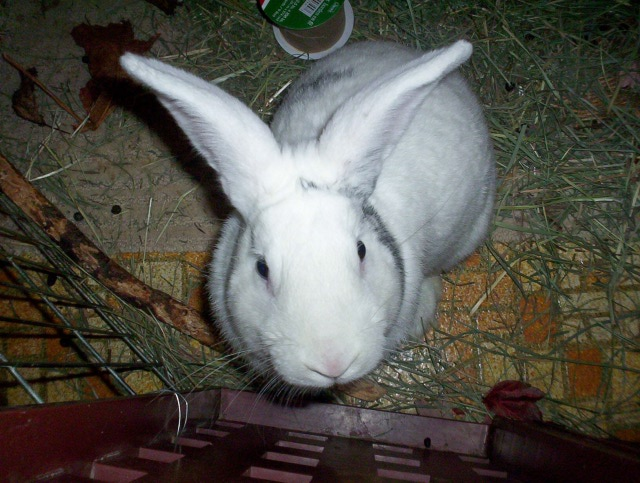 Rabbit urinating outside litter box
Question
Very large white male Very large white
Rabbit urinating outside litter box
Question
Very large white male Very large white
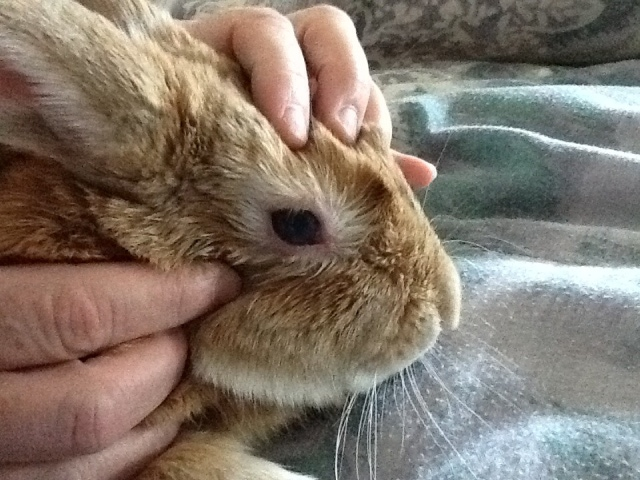 Bunny Eye
Question
Bentleys eye
Our 7 month old bunny Bent
Bunny Eye
Question
Bentleys eye
Our 7 month old bunny Bent
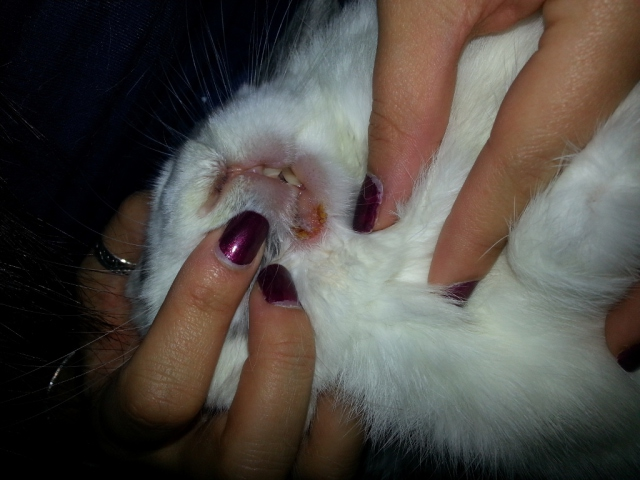 Scabbing around mouth/possible mouth infection?
Question
bubbles mouth
Hello,
My bun Bubbles is
Scabbing around mouth/possible mouth infection?
Question
bubbles mouth
Hello,
My bun Bubbles is
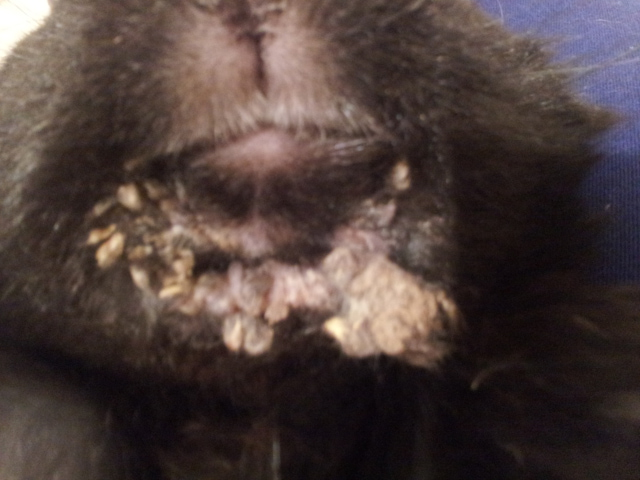 vet is stumped, ongoing scab under the chin
Question
Anyas chin
Hi my rescue bunny has had a
vet is stumped, ongoing scab under the chin
Question
Anyas chin
Hi my rescue bunny has had a
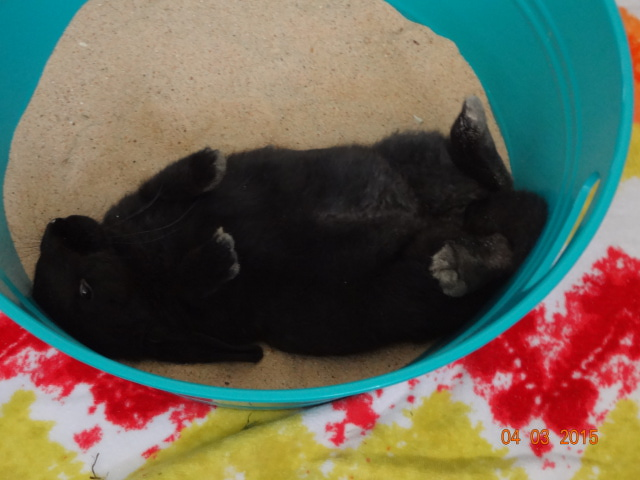 Hard Stomach
Question
Her in Sand :)
Short version: My rabbit
Hard Stomach
Question
Her in Sand :)
Short version: My rabbit